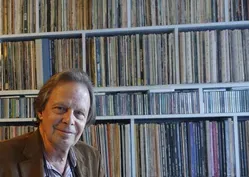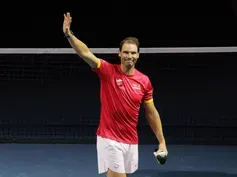
Brooks and Capehart on Trump's federal case dismissals
Clip: 11/29/2024 | 10m 50sVideo has Closed Captions
Brooks and Capehart on the dismissal of Trump's federal cases
With the dismissal of the two federal cases against him, President-elect Donald Trump has bypassed some of the most serious legal jeopardy he faced. He’s now assembling a Cabinet to carry out his agenda. New York Times columnist David Brooks and Jonathan Capehart, associate editor for The Washington Post, discuss that and other matters shaping the transition to a second Trump term.
Problems with Closed Captions? Closed Captioning Feedback
Problems with Closed Captions? Closed Captioning Feedback
Major corporate funding for the PBS News Hour is provided by BDO, BNSF, Consumer Cellular, American Cruise Lines, and Raymond James. Funding for the PBS NewsHour Weekend is provided by...

Brooks and Capehart on Trump's federal case dismissals
Clip: 11/29/2024 | 10m 50sVideo has Closed Captions
With the dismissal of the two federal cases against him, President-elect Donald Trump has bypassed some of the most serious legal jeopardy he faced. He’s now assembling a Cabinet to carry out his agenda. New York Times columnist David Brooks and Jonathan Capehart, associate editor for The Washington Post, discuss that and other matters shaping the transition to a second Trump term.
Problems with Closed Captions? Closed Captioning Feedback
How to Watch PBS News Hour
PBS News Hour is available to stream on pbs.org and the free PBS App, available on iPhone, Apple TV, Android TV, Android smartphones, Amazon Fire TV, Amazon Fire Tablet, Roku, Samsung Smart TV, and Vizio.
Providing Support for PBS.org
Learn Moreabout PBS online sponsorshipWILLIAM BRANGHAM: With the dismissal of the two federal cases against him, president-elect Donald Trump has bypassed some of the most serious legal jeopardy he has faced.
He's now assembling a Cabinet to carry out his agenda.
On that and other matters shaping the transition, we turn to the analysis of Brooks and Capehart.
That's New York Times columnist David Brooks, and Jonathan Capehart, associate editor for The Washington Post.
Gentlemen, so nice to see you.
DAVID BROOKS: Good to be with you.
WILLIAM BRANGHAM: Happy Thanksgiving, day after.
David, on the dismissal of these federal cases, on the one hand, the election cast that die.
If he's the sitting president, the DOJ says, we don't prosecute a sitting president.
Ergo, they go away.
On the other hand, all of this evidence as to what went down leading up to January 6 and the attempt to overthrow that election, all of that evidence of Mar-a-Lago and the classified documents in the bathrooms and ballrooms, all of that goes away.
And I just wonder how that sits with you.
DAVID BROOKS: Yes, I have thought a lot about that this week.
I think, in general, obviously, no person is above the law.
And in my view, if a sitting president has committed a murder, extortion, some horrible crime like that, then the precedent that we don't prosecute sitting presidents, that should be overridden.
In this particular case, some of the trials, especially in New York and Georgia, looked a little political.
Donald Trump ran saying they're attacking me with lawfare.
Kamala Harris talked a lot about the trial, so it was right there in the center of the election.
And 75 million Americans decided it wasn't disqualifying.
And, to my view -- and I understand there's a danger in putting him sort of above the law, but to me the greater danger is that we use trials as political weapons in the years ahead.
So I think, on balance, Jack Smith did the right thing.
WILLIAM BRANGHAM: He was sort of forced in that sense.
He had no choice.
But you would have said that January 6 should not have been pressed even if you're a president?
This is the DOJ policy, but you wouldn't want to see that pushed past... DAVID BROOKS: I just think that was, like, a political event.
And at this point, when the American voters have spoken, I think respect for democracy and for the precedent that we don't use trials as political footballs - - and once we started voting that precedent, I think we're very close to the point where we started using trials as political footballs.
And that would be terrible for politics and for our judicial system.
WILLIAM BRANGHAM: How do you see that?
JONATHAN CAPEHART: Not the way David does.
I mean, I don't see the January 6 trial or the classified documents cases, trials as political weapons.
They were not political weapons.
Our system was attacked, literally attacked, and there needed to be accountability when it comes to January 6.
There needed to be accountability for a former president who took national security secrets, in contravention of the law, and stored them in various places, as you noted in the opening of the question.
So I don't begrudge Jack Smith or Attorney General Merrick Garland for proceeding with the cases.
We can argue, as they are arguing on the Democratic side and on the left, about the speed with which the attorney general moved.
He should have moved faster, some people say.
Other people are saying that he did the right thing in being very judicious, very cautious in proceeding with these cases.
But to say -- to put them in the category of political weapons, I don't think is right, because once you allow something like that to happen without going through the process of trying to get some sort of accountability, then it just gives a green light to the next person to just go ahead.
And, in essence, that's what's happened now.
WILLIAM BRANGHAM: I mean, David's point is that the voters looked at all of that, again, as much as you could, the charges, they don't see all of the evidence, but they looked at it and they sized up Donald Trump and said, we pick him.
JONATHAN CAPEHART: Right.
And that's what's among many things that I found troubling about the 2024 election.
It was all out there.
And he talked about it.
Everyone talked about it.
And yet the American people looked and decided, you know what?
Gas is high, grocery store prices are too high.
And so, yes, we're just going to go with this guy.
Leave aside all sorts of other things he said, such as mass deportations.
Folks just seemed to put that to the wayside.
WILLIAM BRANGHAM: David, there has been talk from Trump and many of his allies that they ought to go after Jack Smith and his entire team to get retribution for this lawfare, as you described it.
What do you think about that?
DAVID BROOKS: Yes, that's a terrible idea.
Jack Smith is being criticized for being too cautious, for taking too much time, for following the rules too much.
There's no way Jack Smith did anything to subvert the rule of law in this country.
It was not -- what he did was not recriminations.
It was not vengeful.
It was just trying to uphold the law.
And he moved slowly.
He moved judiciously.
And if Trump does that, which I expect him to do, it would further undermine the legitimacy of so many of our institutions, especially the rule of law.
WILLIAM BRANGHAM: Let's talk a little bit about this transition.
We are seeing Trump's Cabinet start to take shape.
He certainly seems to be in an emboldened mood, Jonathan.
WILLIAM BRANGHAM: When you look at the Cabinet and his Cabinet-to-be, does it give you a better sense of what Trump 2.0 is going to look like compared to the prior?
JONATHAN CAPEHART: Oh, yes.
Trump 2.0, as we can see right now, at this point in 2016, he didn't have his entire Cabinet or 90 percent of it chosen.
He was still -- he was shocked himself that he won back in 2016.
Now, much more organized.
Everything he said on the campaign trail, he's doing it.
We should not be surprised that RFK Jr. is his choice for HHS.
The one surprise to me is Senator Marco Rubio as secretary of state.
That's, like, one of a few people who you look and go, actually, that's plausible.
Don't agree with him politically, but... WILLIAM BRANGHAM: You could have seen that in a Romney presidency or a George W. Bush.
JONATHAN CAPEHART: Exactly, a Romney or a McCain presidency.
But, look, Donald Trump said, reelect me, I'm going to be disruptive, I'm going to go after the -- quote, unquote -- "deep state."
And that is what he's doing.
He's putting people in agencies who have no qualifications, most of them, have no standing in these agencies, and he's putting them there for the very purpose of metaphorically blowing them up, and, in essence, showing -- saying to the American, that the government's broken.
And by putting in people who don't know how to run the agencies, he's just going to prove, yes, the government's broken.
WILLIAM BRANGHAM: How do you see -- I mean, what do you think the Democrats ought to be doing vis-a-vis this, if they do resist?
DAVID BROOKS: Yes, well, first, they have to stand for institutions.
I'm an institutionalist.
I believe we're born into a world of institutions, the Constitution, the Treasury Department, the U.S. military, the "News Hour."
We enter these institutions, we achieve our moral progress, such as we have it, by adhering to the standards of these institutions.
We become stewards of institutions and try to pass them along better.
It's a whole moral ethos of being an institutionalist.
Trump reverses that.
He thinks all institutions are illegitimate and therefore the people who will be most destructive to institutions, basically the manly men who take what they want and break the rules, those are his paragons of virtue.
They're my paragons of vice.
Restraint, which I regard as a virtue, he regards as a vice.
So it's a complete transvaluation of values, what he's doing, and the Democrats need to stand up for the institutions.
But what they do not need to do is be defenders of the status quo.
And I'm a little afraid they're going to do that.
They're going to see this assault on institutions and say, no, we defend it.
They have to be like a lot of institutionalists - - one of my heroes, George C. Marshall, was chief of staff of the Army in World War II.
He was a firm institutionalist, but he was also a reformer.
He knows that to love an institution, you have to change it.
And in my mind, Democrats cannot be the stand-patters.
We're defending the institutions.
They have to be reformers, not revolutionaries.
WILLIAM BRANGHAM: Do you think that they will do that?
They will make that distinction about saying, maybe there are things that the DOD we ought to look at, or maybe things we ought to look at about COVID policy, or do you think they will just try to put this -- a much stricter wall?
JONATHAN CAPEHART: It depends.
Well, and I agree to a certain extent what David is saying, but it all depends on what, say, a Secretary Hegseth does.
Right.
If he's doing things that are ruinous to the department, and to challenge him means to defend the status quo, well, then I guarantee you Democrats will try their best to defend the status quo.
But we're talking about a Washington where, when you are the party out of power, there's nothing you can do except scream from the sidelines.
Things that will happen at DOD and in these other agencies, they're going to happen.
And Democrats, all they can do is -- at this point is just stand back and scream.
WILLIAM BRANGHAM: Lastly, we are here today after Thanksgiving.
Tell me what you guys said around the Thanksgiving table.
What were you grateful for?
JONATHAN CAPEHART: Oh, well, we were having martinis and a great conversation about politics, but I'm not going to talk about that.
JONATHAN CAPEHART: What I'm thankful for in general are Black women.
They have stood for this democracy.
They stood fast for this democracy in this last election.
And so I am thankful for them.
But, in particular, I'm thankful for two specific Black women.
One is my mom, who turned 83 a couple weeks ago.
WILLIAM BRANGHAM: Happy birthday.
JONATHAN CAPEHART: And so the longer I get to spend time with her, the more grateful I am for her.
And then the other person I'm grateful for is Vice President Harris, who, in the vice presidency and in her 107-day presidential campaign, exemplified Black excellence.
And for those of us in the Black community and those around the country who love us, seeing her on the campaign trail was something to truly be thankful for.
WILLIAM BRANGHAM: Lovely.
David?
DAVID BROOKS: Yes, we talk politics here, but 95 percent of life is not politics.
And it's the most important 95 percent, and it's family, it's relationships, it's faith, whatever.
I have found it so important to be in touch with the arts, with music.
I got to see a da Vinci etching in the last couple of weeks.
That was just such a thrill for me.
And I really needed it.
WILLIAM BRANGHAM: David Brooks, Jonathan Capehart, so great to see you both.
Thank you.
JONATHAN CAPEHART: You too, William.
DAVID BROOKS: Thank you.
New book explores global influences on Western pop music
Video has Closed Captions
Clip: 11/29/2024 | 6m 53s | New book explores roots of Western pop music and global influences that shaped it (6m 53s)
Paris's Notre Dame Cathedral set to make a comeback
Video has Closed Captions
Clip: 11/29/2024 | 9m 4s | Notre Dame Cathedral to reopen 5 years after devastating fire (9m 4s)
Reflecting on Rafael Nadal's storied career in tennis
Video has Closed Captions
Clip: 11/29/2024 | 7m 37s | End of an era: Reflecting on Rafael Nadal's storied career in tennis (7m 37s)
Thousands protest in Georgia after government kills EU bid
Video has Closed Captions
Clip: 11/29/2024 | 5m 39s | Thousands protest in Georgia after government suspends EU bid (5m 39s)
Why this famous New York food critic is moving on
Video has Closed Captions
Clip: 11/29/2024 | 5m 35s | 'I needed to eat a little more sanely' : Why this famous New York food critic is moving on (5m 35s)
Providing Support for PBS.org
Learn Moreabout PBS online sponsorshipSupport for PBS provided by:
Major corporate funding for the PBS News Hour is provided by BDO, BNSF, Consumer Cellular, American Cruise Lines, and Raymond James. Funding for the PBS NewsHour Weekend is provided by...
















